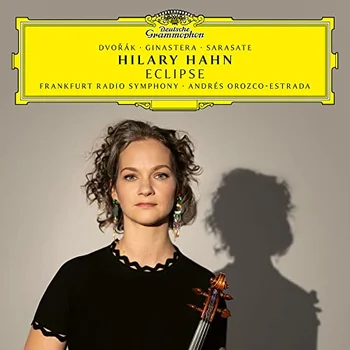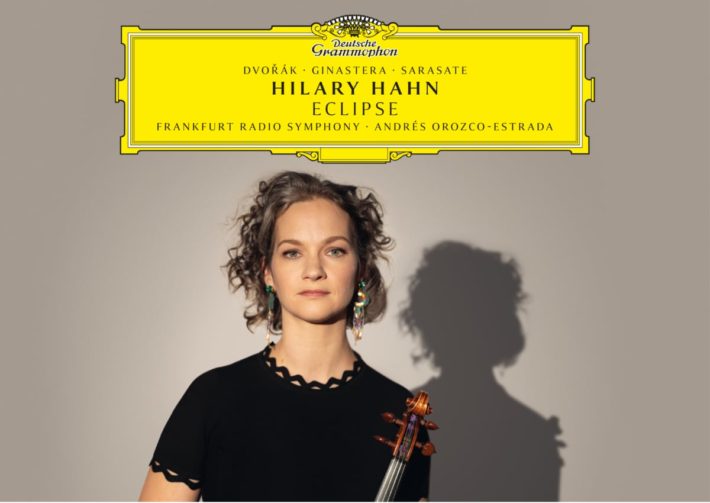Hilary Hahn’s new album, in her own words, almost didn’t happen: a performance sabbatical and the pandemic’s halt on live performances, among other things, put her in a state of limbo with regards to her musical identity and future. One of the people who encouraged her to see this project through was conductor Andrès Orozco-Estrada; the pair’s collaboration yields a vibrant and challenging program: violin concertos by Dvořák and Ginastera, and to top it off, Sarasate’s well-loved Carmen Fantasy.

Among the two concerti, it’s the Ginastera that stands out. A commission by the New York Philharmonic for the opening of Lincoln Center, it sounds much more angst ridden than celebratory–but it’s undoubtedly meant to challenge the performer and impress the listener. Hahn is probably at her most comfortable in this work. The cadenza (track 4), placed unconventionally at the beginning, showcases a number of techniques: acrobatic double stops, screaming double trills, and pointed pizzicatos, all of which she handles with aplomb. The entrance of the orchestra (track 5) is no less ominous. The Frankfurt Radio Symphony’s strong horn and percussion sections help drive the stormy, martial mood which at times feels terrifying (0’53” sounds all too realistically like thunder).
The first movement is divided into smaller sub-movements, each its own etude. Particularly impressive is Studio IV (track 8), centered around arpeggios: Hahn leverages some excellent bow control here. Her clean and faultlessly even approach gives the figures a lace-like yet dynamic texture which complements the ensemble’s lyrical melody. Studio V, too, offers plenty of nuance. The soloist exhibits excellent command of the harmonics, enough so to give us a wide spectrum of characters that sob, heave, and whisper. Meanwhile, the harp creates round droplets of sound while the xylophone’s chimes sound clusters are ghostly and dreamlike. The Perpetuum Mobile (track 14) is the final virtuosic hurdle for soloist and orchestra alike: it’s a shame that the details of Hahn’s fine fingerwork are overshadowed by the orchestra’s sheer sound mass, but the performance is nonetheless unapologetically aggressive (as it should be) and the energy riveting.
In the Sarasate, I sensed hints of hesitation in Hahn’s opening passages (track 15), but once she finds her footing—in the virtuosic passages nonetheless—we get the bits of flair befitting of Carmen while the orchestra provides continued reassurance with its consistent rhythmic backdrop. The passage using the violin’s harmonics (2″22′) is nicely executed with Hahn’s piercing clarity. There’s an added element of suspense, thanks in part to how the ensemble scales back the rhythmic pulse and its presence to barely above a whisper. The Moderato (track 16) is a little too elegantly reserved for my taste, as I wished to hear more of the theme’s two distinct characters in dialogue, as we do in the 1987 DG Perlman/Mehta recording.
The Allegro moderato (track 18), however, benefits from Hahn’s lighter approach: she captures the graceful rhythmic swing and the arpeggiated flourishes sound breezy and effortless. I did also catch some nice vocal qualities in moments like 1’19” onwards; the slides between the notes sound quite natural, as do the upswings to the highest notes in the phrases. The finale (track 19) unfortunately takes overly measured a tempo, which leads to the soloist’s otherwise meticulous playing to sound a bit too wary. If you listen closely, you might also be able to perceive some mismatches (though very slight) between Hahn and orchestra in moments when she tries to lurch forward. As far as comparisons go, Sarah Chang (with Placido Domingo/Berlin Philharmonic) takes a comparatively breakneck–and exciting–speed but does not sacrifice clarity and finesse.
I found Hahn’s forward in the booklet forthright and illuminating in her struggles to put out the album. The revelation only goes to show the amount of consideration and tribulation a musician faces well beyond the recording process. Robert Kerzinger’s liner notes on the works themselves have a solid balance of historical context and more technical musical elements to listen for. Where clarity is concerned, the sound engineering is satisfactory though balance is another story: it would have been nice to hear more of the violin throughout and maybe a bit less of certain bass and percussion textures, some of which come off as unnaturally boomy.
While this may not be the finest of Hahn’s outputs, it refreshingly honest with its moments of hesitation and vulnerability paired against others of virtuosity and firm resolve. A recommended listen, especially for the Ginastera.
Recommended Comparisons
Eclipse
Hilary Hahn – Violin
Frankfurt Radio Symphony
Andrès Orozco-Estrada – Conductor
DG, CD 4862383



















